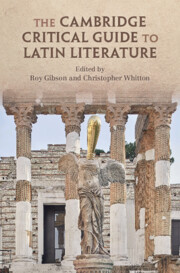Book contents
- The Cambridge Critical Guide to Latin Literature
- The Cambridge Critical Guide to Latin Literature
- Copyright page
- Dedication
- Contents
- Figures and Tables
- Contributors
- Preface
- Abbreviations
- Chapter 1 Introduction
- Chapter 2 Canons
- Chapter 3 Periodisations
- Chapter 4 Author and Identity
- Chapter 5 Intertextuality
- Chapter 6 Mediaeval Latin
- Chapter 7 Neo-Latin
- Chapter 8 Reception
- Chapter 9 National Traditions
- Chapter 10 Editing
- Chapter 11 Latin Literature and Linguistics
- Chapter 12 Latin Literature and Material Culture
- Chapter 13 Philosophy
- Chapter 14 Political Thought
- Chapter 15 Latin Literature and Roman History
- Chapter 16 Latin Literature and Greek
- Envoi
- Index Locorum
- General Index
- References
Chapter 13 - Philosophy
Published online by Cambridge University Press: 04 January 2024
- The Cambridge Critical Guide to Latin Literature
- The Cambridge Critical Guide to Latin Literature
- Copyright page
- Dedication
- Contents
- Figures and Tables
- Contributors
- Preface
- Abbreviations
- Chapter 1 Introduction
- Chapter 2 Canons
- Chapter 3 Periodisations
- Chapter 4 Author and Identity
- Chapter 5 Intertextuality
- Chapter 6 Mediaeval Latin
- Chapter 7 Neo-Latin
- Chapter 8 Reception
- Chapter 9 National Traditions
- Chapter 10 Editing
- Chapter 11 Latin Literature and Linguistics
- Chapter 12 Latin Literature and Material Culture
- Chapter 13 Philosophy
- Chapter 14 Political Thought
- Chapter 15 Latin Literature and Roman History
- Chapter 16 Latin Literature and Greek
- Envoi
- Index Locorum
- General Index
- References
Summary
Often viewed as derivative, philosophy written in Latin has in recent years been enjoying a scholarly renaissance, as critics realise that philosophical thought does not develop in a vacuum but is intrinsically linked to the time, place and language in which it is expressed.This chapter brings a historicising approach to the phenomenon of Roman philosophy, combining a diachronic narrative with a focus on particular themes.After considering the Roman adoption of Greek philosophy in the second century BCE, I use Lucretius as a case study for the Latinisation of Greek thought and Cicero as an example of the political and cultural uses of philosophy in the late Republic.I explore some of the many appearances of philosophy in Latin poetry – evidence of the saturation of the Roman cultural imaginary with philosophical ideas and the fact that Latin philosophical writing was not restricted to genres viewed as philosophical.Moving into the Empire, I discuss Seneca as a proponent of philosophy as a way of life and consider the self-representation of philosophers, with a focus on Apuleius, before concluding with an exploration of the Christianisation of philosophy in late antiquity.
Keywords
- Type
- Chapter
- Information
- The Cambridge Critical Guide to Latin Literature , pp. 700 - 752Publisher: Cambridge University PressPrint publication year: 2024



